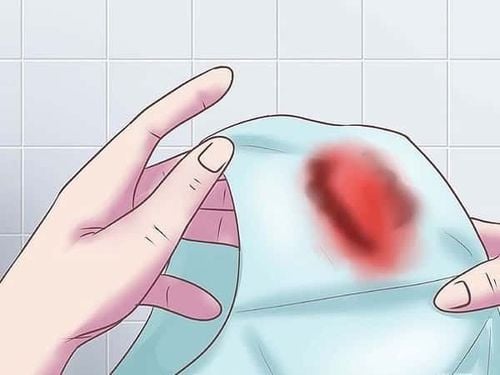This is an automatically translated article.
The article was professionally consulted by Specialist Doctor I Le Thi Phuong - Department of Obstetrics and Gynecology - Vinmec Ha Long International Hospital. Dr. Le Thi Phuong has 29 years of experience in the field of obstetrics and gynecology.Pregnancy after a miscarriage can leave many women stressed and worried about the risk of a repeat miscarriage. Find out what to do after a miscarriage to help moms start a healthy next pregnancy.
1. Causes of Miscarriage
A miscarriage is the spontaneous loss of a pregnancy before the 20th week of pregnancy. The miscarriage rate in women accounts for about 8 - 20%, but the actual number of miscarriages may be higher because many women have had a miscarriage even before they found out they were pregnant. Miscarriage usually only happens once, and most women after a miscarriage can go on to start a new, completely healthy pregnancy. Multiple miscarriages account for only 1% of all cases.The risk of a repeat miscarriage in a next pregnancy in a woman who has had a previous miscarriage is:
After a miscarriage: About 20%; After two consecutive miscarriages: About 28%; After three consecutive miscarriages: About 43%; Many miscarriages are caused by the fetus not developing normally, of which about 50% of early pregnancy loss is related to problems with the baby's chromosomes. Most chromosomal abnormalities occur randomly as the embryo divides and develops, but it is more common in older women. Other health problems, such as poorly controlled diabetes or uterine problems, can also lead to miscarriage. In general, though, the cause of miscarriage is not always clear.

2. What to do after miscarriage?
After a miscarriage, if there is no fetal tissue left in the uterus, the patient will not need to be treated. However, in case there is still some fetal tissue left in the uterus, the doctor may suggest:Wait for the pregnancy tissue to naturally come out of the uterus. Mother can wait from 7-14 days after miscarriage for the tissue to come out naturally. A miscarriage ends when the pain and bleeding stop completely. If symptoms do not improve or even get worse, or testing after 3 weeks shows that you are still pregnant, your doctor may need to proceed with drug treatment or surgery. You should go to the hospital right away if you experience bleeding or severe pain, sometimes accompanied by a high fever, during this waiting period.
Use stimulant drugs to push the fetal tissue out of the uterus If the pregnancy tissue does not come out naturally within 2 weeks, women need to use drugs placed directly into the vagina, which stimulates the cervix to dilate to push. tissues out. The medication will start working within a few hours causing women to experience symptoms similar to heavy menstrual bleeding, including cramping and vaginal bleeding that can last up to 3 weeks.
Most of the treatment will take place at home, but the patient needs to see a doctor immediately if there is excessive bleeding or, conversely, the bleeding does not occur within 24 hours after the injection. In case the home pregnancy test results after 3 weeks of taking the drug show that you are still pregnant, the patient may need surgery.
Surgery to remove fetal tissue Surgery is performed to remove all remaining fetal tissue in the following cases: the patient has heavy continuous bleeding; fetal tissue has become infected; or two forms of treatment, natural waits and prescription drugs are not successful. Your doctor will use a suction device, combined with anesthetic and/or local anesthetic, during complete removal of the fetal tissue.
All of the above have very rare risks of complications and the choice of treatment will depend on the situation of each patient.

3. Best time to get pregnant after miscarriage
Miscarriage can bring intense feelings of loss, causing both couples to go through times of sadness, anxiety, or even guilt. Therefore, experts often advise couples not to rush and try to conceive right after.Women should avoid sex for two weeks after a miscarriage, or until all symptoms of miscarriage have gone, to prevent infection. The menstrual cycle will gradually stabilize after about 2 weeks to a few months, when ovulation returns to normal, it is also time for women to be able to conceive if not using birth control methods.
Once a woman feels emotionally and physically ready, she should consult her doctor to safely continue a pregnancy after a miscarriage. This shouldn't be too complicated if you've only had one miscarriage, but if you've had two or more miscarriages, your doctor may suggest you do some tests and exams to find any abnormalities. often.
4. Common Tests Before Pregnancy After Miscarriage
For patients who have had two or more miscarriages in a row, the doctor may recommend some tests to find the main cause of miscarriage before getting pregnant again. Such as:Blood tests: Helps detect abnormalities in a woman's hormones or immune system; Chromosome testing: Both husband and wife should be tested to determine if the mother's chromosomes are a factor in the miscarriage; Fetal tissue aborted: If available, doctors may also sometimes recommend testing; Examination of the uterus with conventional ultrasound or hydrops, laparoscopy, X-rays, and magnetic resonance imaging (MRI). In fact, there are many cases where patients who have had multiple miscarriages are still able to have a healthy pregnancy again. Therefore, women should not be too desperate if they cannot determine the cause of miscarriage through the above tests.
5. Measures to increase your chances of a healthy pregnancy

It is recommended to take prenatal vitamins or folic acid every day, it is best to start this habit a few months in advance, right when you are planning to conceive; During pregnancy, pregnant women need to limit caffeine consumption and avoid drinking alcohol, smoking as well as all other dangerous stimulants. Excitement and anxiety are common emotions in women during pregnancy after miscarriage. While starting a new pregnancy can be a lot of fun, anxiety and depression are still present even after a healthy baby is born. Therefore, women in this stage should actively share their feelings with their partners, family members or friends for mental comfort. If you encounter any difficulties around what to do after a miscarriage, you can consult a specialist for further advice and support.
Women with a history of miscarriage need to be extra cautious in subsequent pregnancies. In order to maximize the possibility of conception and ensure a healthy pregnancy, before planning a pregnancy, both husband and wife should have a reproductive health checkup from 3-5 months. You will be examined for fertility and sexual health, screened for sexually transmitted diseases, and screened for genetic diseases. In particular, this examination process will be able to detect early causes that can lead to infertility and infertility so that early intervention measures can be taken. Doctors will also advise on the best time to give birth and measures to be able to give birth to healthy and intelligent children.
Vinmec International General Hospital is implementing a pre-pregnancy health care and counseling program to help mothers prepare for the best health before pregnancy. With this program, you will receive:
General health examination, especially gynecological examination, to help assess the possibility of conception as well as the health of mother and baby during pregnancy. Vaccination before pregnancy, helps prevent many dangerous diseases, especially Rubella. Genetic counseling helps identify risk factors, helps clients and families make decisions, and prevents occurrence or re-emergence in the family. Screening detects healthy people carrying disease genes, especially hemolytic anemia. Doctors will analyze the results and provide specific genetic counseling for you to proactively take preventive and intervention measures. website for service.

Please dial HOTLINE for more information or register for an appointment HERE. Download MyVinmec app to make appointments faster and to manage your bookings easily.
Reference source: mayoclinic.org; nhs.uk













